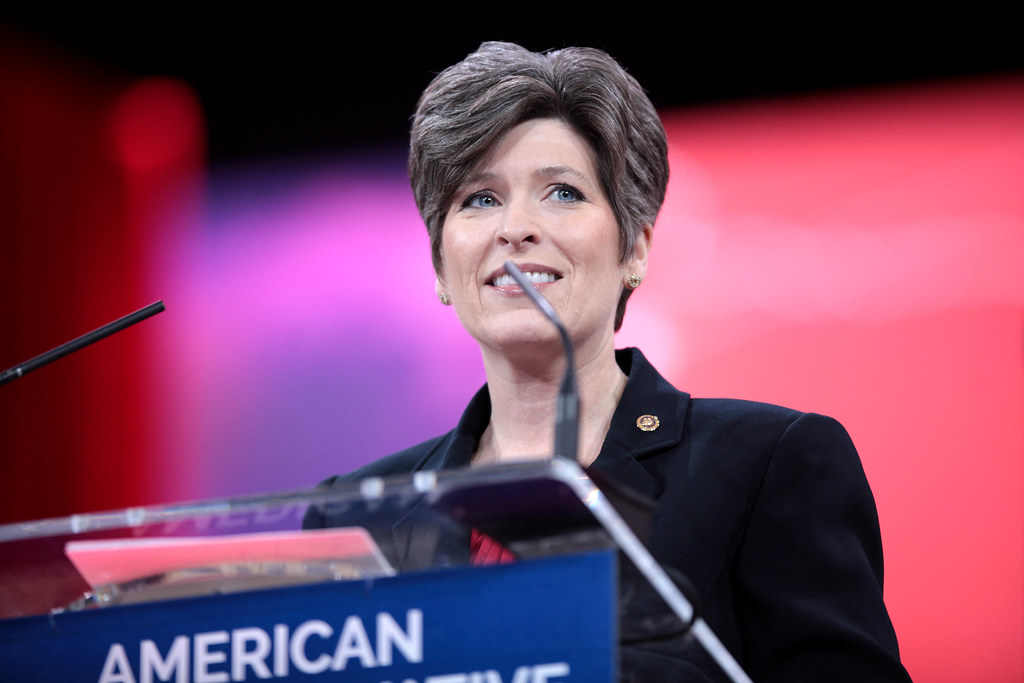Key Takeaways:
• Senator Joni Ernst of Iowa will not seek re-election in 2026.
• Her decision adds to a wave of GOP retirements and worries about the party’s future.
• Democrats see a strong chance to flip the Iowa Senate seat.
• Critics point to Ernst’s “we are all going to die” remark as a factor in her exit.
• Early polls show Democratic challengers gaining ground in Iowa.
Senator Joni Ernst’s decision to step down has sent shockwaves through politics. For years, she was viewed as a rising star and possible future vice president or defense chief. Now, her choice not to run again marks another blow to the Republican brand.
What Led to Joni Ernst Retirement?
Many believe several factors triggered the Joni Ernst retirement. First, she made a high-profile gaffe at a town hall, telling voters upset about cuts to Medicaid and Medicare, “Well, we are all going to die.” That comment drew sharp criticism and may have hurt her support.
Moreover, recent polls show her trailing Democratic challengers. One internal campaign poll for Iowa State Senator Zach Wahls had Ernst narrowly behind. Fellow Democrat Josh Turek also polled close. Facing stiff competition, she likely saw the writing on the wall.
Ernst also follows other top Republicans out the door. Senators Mitch McConnell, Thom Tillis, and Tommy Tuberville have already announced retirements. Even Marsha Blackburn is eyeing a governor’s race. This pattern suggests GOP senators fear tough contests ahead.
Impact of Joni Ernst Retirement on Politics
The Joni Ernst retirement will reshape the 2026 Senate map. Democrats now see a clear path to win this seat. Iowa Democratic leaders are already celebrating. State Senator Zach Wahls said Iowans are fed up with rising costs and corruption. He vowed to flip the seat next year.
Meanwhile, critics of the GOP say this trend shows a weakening party. Neera Tanden of the Center for American Progress called Senate Republicans “glass jaws all the way down.” Political commentator Sophia A. Nelson predicted senators Bill Cassidy and Susan Collins will be next to retire.
Chuck Todd joked that in another universe, where Trump never took over the GOP, Ernst might now be vice president or a presidential candidate. Such remarks highlight how dramatically the party has shifted since 2016.
Why This Matters Beyond Iowa
The Joni Ernst retirement could signal a bigger shift in national power. Recent generic ballot polls give Democrats a consistent lead. A CNBC survey showed Democrats up by five points, a warning sign for Republicans. In the last three midterms after a new president took office, the party out of power gained House seats. Republicans cannot ignore these trends if they hope to hold Congress.
On top of that, Donald Trump’s key policies—tariffs, immigration, economic plans—are unpopular outside his core supporters. As more GOP senators bow out, Democrats gain momentum and fundraising power. Flip enough seats, and they could regain control of both the Senate and the House in 2026.
Mixed Reactions and Next Steps
Democrats are already lining up their campaigns. Zach Wahls and Josh Turek both claim they will hold Republicans accountable for cutting healthcare. They promise to fight for Iowa families and reject billionaires’ tax breaks.
Republican operatives, however, caution against over-confidence. They argue that Iowa still leans conservative in many areas. They point out that Ernst won re-election in 2020 and that name recognition can matter even for new candidates. Yet, the GOP will have to work harder to recruit strong contenders and raise funds.
For Senator Ernst herself, the decision ends an eight-year Senate career that began in 2015. At age 55, she may pursue other roles in public service or move into the private sector. Her formal announcement is expected next Thursday.
Lessons from the Joni Ernst Retirement
First, high-stakes gaffes can have long-term effects. Ernst’s town hall comment haunted her throughout this year. Second, party image matters. As more senators retire, voters may see a lack of confidence in GOP leadership. Third, midterm dynamics favor the party out of the White House. With a Democratic president, the GOP needed to show strength—but is instead losing key players.
Ultimately, the Joni Ernst retirement reflects a volatile political era. Both parties must adapt. Democrats see a rare opportunity. Republicans face the challenge of rebuilding their brand and message.
FAQs
What was Joni Ernst’s main reason for retiring?
Multiple factors played a role, including a widely criticized town hall remark, tight polls against Democratic challengers, and a broader trend of GOP retirements suggesting tough races ahead.
How will the Iowa Senate race change without Ernst?
Her exit opens the field for Democratic contenders like Zach Wahls and Josh Turek. Early polls show a competitive race, giving Democrats a strong chance to flip the seat.
Does this retirement affect national politics?
Yes. The loss of an incumbent makes it harder for Republicans to hold the Senate majority. Combined with favorable generic ballot trends, it could help Democrats regain control in 2026.
Could Joni Ernst return to politics later?
While she has not ruled out future public service, she seems poised to step away from electoral politics. She may explore roles in advocacy, consulting, or the private sector.
